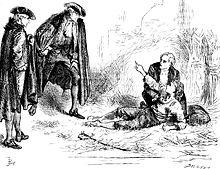Marquis St. Evrèmonde
| Marquis St. Evrémonde | |
|---|---|
| A Tale of Two Cities character | |

The Evrémonde brothers (left) by Fred Barnard, 1870s
|
|
| Created by | Charles Dickens |
| Portrayed by | Basil Rathbone |
| Information | |
| Nickname(s) | Monsieur the Marquis |
| Gender | Male |
| Title | Marquis |
| Nationality | French |
The Marquis St. Evrémonde is a fictional character in Charles Dickens' A Tale of Two Cities.
The Marquis or Monseigneur St. Evrémonde appears (in life) for only three chapters in Book the Second, symbolizing the pitiless, arrogant, French aristocracy. About 60 years old, with a face like a mask, he is Charles Darnay's uncle and twin brother of Charles Darnay's father (now deceased).
While still handsome, fashionable, and exquisitely poised, the Marquis St. Evrémonde is out of favor at the royal court for reasons that are not specified. In "Monseigneur in Town", the Marquis is greeted without warmth by "Monseigneur" (a great lord and senior courtier) at the latter's Parisian reception. Snubbed, he waits until all Monseigneur's sycophants and hangers-on file out, then murmurs a curse sending Monseigneur to the Devil. (Note that the curse is uttered in a mirrored salon, possibly suggesting that it rebounds on the speaker.) The Marquis St. Evrémonde's carriage heads for his country chateau through the streets of Paris, at the break-neck pace favored by the nobility. Although most pedestrians scatter in terror, his carriage runs over a little child; being one of Gaspard's. The Marquis shows no remorse at the sight of the crushed body — inquiring whether his horses are alright — and, "with the air of a gentleman who had accidentally broke some common thing, and had paid for it", throws a gold coin to the distraught father. The Defarges appear—Ernest Defarge to comfort the grieving Gaspard; Madame Defarge to stand erect, stare at the Marquis boldly in the face and knit his Fate. The remainder of the crowd watches in cowed silence but an unknown hand throws the coin back into the carriage. Before driving on, the Marquis responds with cold contempt that he would willingly ride over any of "you dogs" and exterminate them. This scene foreshadows the oncoming revolution in France.
The Marquis St. Evrémonde appears in the two following chapters "Monseigneur in the Country" (when he is told by a road worker that a dust-covered figure was hanging on to the bottom of his carriage) and "the "Gorgon's Head" (dining with his nephew, Charles Darnay). Dickens uses his account of the journey of the indifferent Marquis through the countryside surrounding his chateau to graphically describe the poverty and desperation of the peasantry.
During the dinner between uncle and nephew, Charles Darnay apologizes for being detained in London. He alludes to his danger there (his recent treason trial) wondering aloud if his uncle did not in fact orchestrate the accusations brought against him. Charles further believes that if the Marquis were still in the French Court's good graces, he would obtain a lettre de cachet and have his nephew imprisoned in France. His uncle confesses that for the honor of the family, he '"would do exactly that'".
...
Wikipedia
